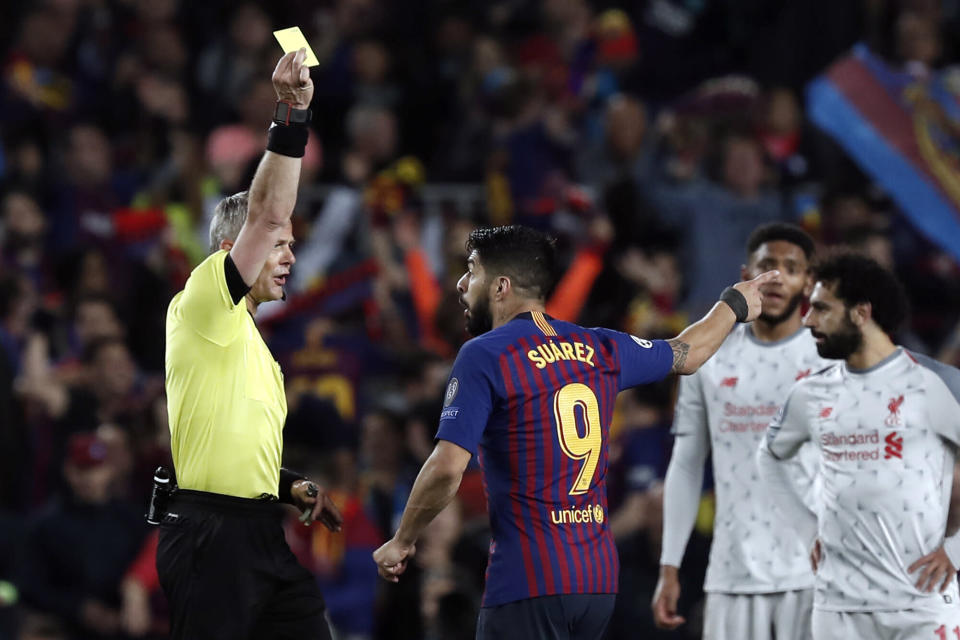Is Luis Suarez, the divine striker who has magnified Messi's impact, under-appreciated?
In the end, it was both fitting and appropriate that Lionel Messi should get the plaudits. That’s just how it’s been. The Argentine, who has left no doubt at all that he’s the greatest player in the sport’s history, scored twice for FC Barcelona in its 3-0 Champions League semifinal first-leg victory over an excellent Liverpool.
Messi had scored a tap-in and yet another stupefying free kick, and deep in injury time he’d teed up Ousmane Dembélé for what should have been a fourth. The stadium chanted his name again and again, bowing to this otherworldly little player.
And so, once again, Luis Suarez was sort of forgotten about.
But after netting just a single goal in Barca’s European campaign last season, and failing to get one until Wednesday night in this continental season, he’d gotten the opening goal from a marvelous run and finish. And it was his kneed shot that kissed off the bar for Messi to walk into an empty net.
A goal's a goal 🤷♂️
Messi follows up Suarez's attempt to double Barca's lead 🐐
Watch the final minutes NOW on #BRLive: https://t.co/aMrBVxHWxy pic.twitter.com/Hhn5n0SWmc— Bleacher Report Live (@brlive) May 1, 2019
It was Suarez who caused chaos with his endless labor, tearing through Liverpool’s half and giving its otherwise sound defense fits. And it was Suarez who redirected Jordi Alba’s low cross with the perfect sliding redirection in the 26th minute, a goal forged from his savvy movement and immaculate finish.
Alba put it on a platter 😮🙌 pic.twitter.com/mp6Bs2iQbJ
— Bleacher Report Live (@brlive) May 1, 2019
Suarez, of course, couldn’t resist celebrating wildly against his former club, where he’d scored 82 goals for the Reds in just 3½ seasons. It flew in the face of conventional soccer politesse of pretending to feel conflicted about scoring against your former employers — an asinine and artificial ritual, when you consider that your new fans might just as rightfully taken offense at you not celebrating for them.
Imagine ever thinking Luis Suarez was going to do a muted celebration. pic.twitter.com/O7grLiv9GB
— FootballJOE (@FootballJOE) May 1, 2019
But then that’s Suarez too. He’s a troll. He’s a villain. The ultimate villain.
He’s the guy who, minutes after scoring his goal, shoved Liverpool’s Mohamed Salah to the ground, distilling the very essence of Luis Suarez — a brilliant goal followed by a cheap, petulant shot at a respected opponent. A divine goal and a dirtbag move.
He’s the guy who kept Uruguay in a World Cup by punching a ball off the goal-line and then cheering as if he was possessed after he’d been sent off and Ghana missed the penalty kick — the ultimate affront to sportsmanship. He’s the guy who has bitten not one, not two, but three opponents on the soccer field. The guy who racially abused Manchester United’s Patrice Evra during a game.
Suarez isn’t merely a master in the game’s dark arts, flopping and stamping and jawing and inciting and niggling and doing anything at all if it makes his chances of scoring or winning minutely more likely. He practically invented the dark arts.
It’s probably why Suarez is also hugely under-appreciated.
In his fifth year with Barca, Suarez has won both La Liga and the Copa del Rey four times. And he’ll likely get a chance to claim a second Champions League trophy on June 1. In the meantime, he’s scored a jaw-dropping 177 goals in 246 appearances for the club — already good for fifth all-time, in less than half a decade — even though he’s never been the focal point of the attack.

Suarez led a modestly talented Uruguay team to a World Cup semifinal, a quarterfinal and a Copa America trophy. He’s its all-time leading scorer with 55 goals in 106 caps, an outstanding conversion rate on a defensive-minded team where he’s also not been used as the central striker.
Yet for all his goals, Suarez is surprisingly unselfish, like late on against Liverpool, when he should have finished a clear chance himself, rather than attempting to return the ball to Messi. It’s one of the many incongruous things about his personality, the volatile blending with the servile.
Part of Suarez’s genius lay in his adaptability. At Ajax, before joining Liverpool, he seamlessly transitioned from being Klaas-Jan Huntelaar’s provider to finishing the goals himself, once the latter left for Real Madrid. With the Reds, he had to be both creator and finisher. At Barca, the first bullet point in his job description was to stay out of Messi’s way.
Messi had burned through several other world-class strikers — Samuel Eto’o, Zlatan Ibrahimovic, Thierry Henry, David Villa, Alexis Sanchez — but found that they constricted him. Suarez has magnified Messi’s impact, rather than to reduce him in some way. Since Suarez’s move to Catalonia in 2014, the two have developed an instinctive and mutually beneficial relationship.
Because Suarez delivers the toil Messi eschews. He closes down defenders and goalkeepers and generally makes a pest of himself, enabling Messi to conserve his energy for when the mood strikes him to rip through opposing teams. At 32, Suarez is no longer the dynamo who covered the entire width of the field by himself, but he remains mobile and tireless.
The epitaph for his career, however, has already been written. Luis Suarez is the guy who bit and baited opponents, who hounded referees and begged for spurious penalties. That’s the Suarez who will be remembered, rather than one of the finest forwards of his time.
That’s his own doing, of course. But he might never be fully appreciated as a footballer.
Leander Schaerlaeckens is a Yahoo Sports soccer columnist and a sports communication lecturer at Marist College. Follow him on Twitter @LeanderAlphabet.
More from Yahoo Sports:


